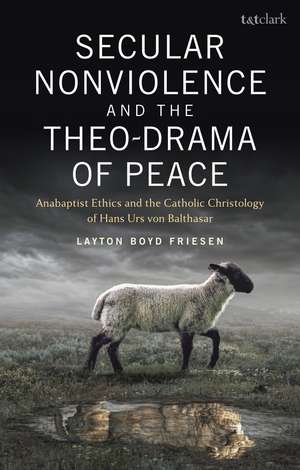Secular Nonviolence and the Theo-Drama of Peace: Anabaptist Ethics and the Catholic Christology of Hans Urs von Balthasar: T&T Clark Studies in Anabaptist Theology and Ethics
Autor Dr Layton Boyd Friesenen Limba Engleză Paperback – 9 feb 2022
| Toate formatele și edițiile | Preț | Express |
|---|---|---|
| Paperback (1) | 152.73 lei 22-36 zile | |
| Bloomsbury Publishing – 9 feb 2022 | 152.73 lei 22-36 zile | |
| Hardback (1) | 436.57 lei 43-57 zile | |
| Bloomsbury Publishing – 9 feb 2022 | 436.57 lei 43-57 zile |
Preț: 152.73 lei
Preț vechi: 166.04 lei
-8% Nou
Puncte Express: 229
Preț estimativ în valută:
29.22€ • 30.59$ • 24.18£
29.22€ • 30.59$ • 24.18£
Carte disponibilă
Livrare economică 17-31 martie
Preluare comenzi: 021 569.72.76
Specificații
ISBN-13: 9780567704030
ISBN-10: 0567704033
Pagini: 264
Dimensiuni: 138 x 216 x 23 mm
Greutate: 0.32 kg
Editura: Bloomsbury Publishing
Colecția T&T Clark
Seria T&T Clark Studies in Anabaptist Theology and Ethics
Locul publicării:London, United Kingdom
ISBN-10: 0567704033
Pagini: 264
Dimensiuni: 138 x 216 x 23 mm
Greutate: 0.32 kg
Editura: Bloomsbury Publishing
Colecția T&T Clark
Seria T&T Clark Studies in Anabaptist Theology and Ethics
Locul publicării:London, United Kingdom
Caracteristici
Examines how Mennonite nonviolence emerged as deeply congruent with the agenda of a progressive secular age
Notă biografică
Layton Boyd Friesen is Conference Pastor of the Evangelical Mennonite Conference, Canada.
Cuprins
Introduction: Anabaptist Ethics and Hans Urs Von Balthasar's ChristologyChapter 1Mennonite Pacifism as Union with the Living ChristChapter 2The Troubled Defense of Defenselessness in the 20th centuryChapter 3A Bi-Directional Nonresistance from Maximus to BalthasarChapter 4The Lamb's Provocation of ViolenceChapter 5Convocation: Ecclesial Enemy Love and a Missional PacifismConclusion Sources UsedBibliographyIndex
Recenzii
In this important work, Anabaptist peace and Balthasarian beauty meet and kiss one another in the person of Jesus Christ. This is a book of constant surprises, from its insightful retrieval of St. Maximus Confessor to its moving descriptions of God's urgent, non-resistant love. An illuminating exploration in cross-confessional Christian ethics.
Secularism may suppose that the Mennonite peace ethic no longer requires theological underpinnings. Appropriating the incarnational theology of the Catholic theologian Hans Urs von Balthasar, Layton Friesen's seminal work challenges secularism's allure, and persuasively argues for a theo-dramatic, gospel pacifism that leads to the genuine healing of the human community. Highly recommended!
In Secular Nonviolence and the Theo-Drama of Peace, Layton Friesen has made a substantive, and much needed, contribution to a Mennonite theological ethic. Appealing to the Anabaptist tradition of Schleitheim, Marpeck, and Martyrs Mirror, and appropriating the Orthodox Christology of Maximus the Confessor as mediated by the theo-dramatic perspective of Catholic theologian Hans Urs Von Balthasar, Friesen reclaims the Chalcedonian definition of Christ's incarnation as the dogmatic undercarriage of gospel pacifism. Crucially, Friesen demonstrates how Christ's bidirectional nonresistance-his personal yieldedness to the Father and to the human condition-is the spiritual centre and practical pattern of defenseless discipleship. Friesen thus helpfully shifts peace apologetics away from the secular rhetoric of the social-political relevance of nonviolence typical of modern Mennonite peace positions and programs and back towards a distinctively Christian ethic grounded dogmatically in the church's confessional-contemplative union with the incarnate-crucified Christ and motivated evangelically by God-in-Christ's love for the world. I heartily commend Friesen's work to Mennonite theologians and ethicists, both scholars and students, in sincere hope that it receives the serious, patient engagement that it deserves.
Secularism may suppose that the Mennonite peace ethic no longer requires theological underpinnings. Appropriating the incarnational theology of the Catholic theologian Hans Urs von Balthasar, Layton Friesen's seminal work challenges secularism's allure, and persuasively argues for a theo-dramatic, gospel pacifism that leads to the genuine healing of the human community. Highly recommended!
In Secular Nonviolence and the Theo-Drama of Peace, Layton Friesen has made a substantive, and much needed, contribution to a Mennonite theological ethic. Appealing to the Anabaptist tradition of Schleitheim, Marpeck, and Martyrs Mirror, and appropriating the Orthodox Christology of Maximus the Confessor as mediated by the theo-dramatic perspective of Catholic theologian Hans Urs Von Balthasar, Friesen reclaims the Chalcedonian definition of Christ's incarnation as the dogmatic undercarriage of gospel pacifism. Crucially, Friesen demonstrates how Christ's bidirectional nonresistance-his personal yieldedness to the Father and to the human condition-is the spiritual centre and practical pattern of defenseless discipleship. Friesen thus helpfully shifts peace apologetics away from the secular rhetoric of the social-political relevance of nonviolence typical of modern Mennonite peace positions and programs and back towards a distinctively Christian ethic grounded dogmatically in the church's confessional-contemplative union with the incarnate-crucified Christ and motivated evangelically by God-in-Christ's love for the world. I heartily commend Friesen's work to Mennonite theologians and ethicists, both scholars and students, in sincere hope that it receives the serious, patient engagement that it deserves.


